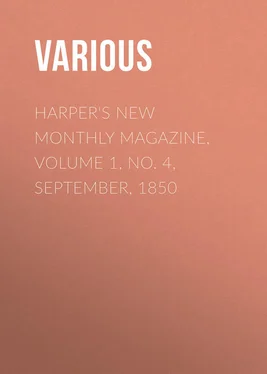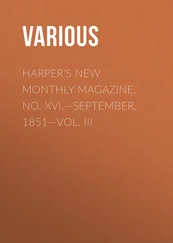Various - Harper's New Monthly Magazine, Volume 1, No. 4, September, 1850
Здесь есть возможность читать онлайн «Various - Harper's New Monthly Magazine, Volume 1, No. 4, September, 1850» — ознакомительный отрывок электронной книги совершенно бесплатно, а после прочтения отрывка купить полную версию. В некоторых случаях можно слушать аудио, скачать через торрент в формате fb2 и присутствует краткое содержание. Издательство: Иностранный паблик, Жанр: periodic, foreign_edu, на английском языке. Описание произведения, (предисловие) а так же отзывы посетителей доступны на портале библиотеки ЛибКат.
- Название:Harper's New Monthly Magazine, Volume 1, No. 4, September, 1850
- Автор:
- Издательство:Иностранный паблик
- Жанр:
- Год:неизвестен
- ISBN:нет данных
- Рейтинг книги:5 / 5. Голосов: 1
-
Избранное:Добавить в избранное
- Отзывы:
-
Ваша оценка:
- 100
- 1
- 2
- 3
- 4
- 5
Harper's New Monthly Magazine, Volume 1, No. 4, September, 1850: краткое содержание, описание и аннотация
Предлагаем к чтению аннотацию, описание, краткое содержание или предисловие (зависит от того, что написал сам автор книги «Harper's New Monthly Magazine, Volume 1, No. 4, September, 1850»). Если вы не нашли необходимую информацию о книге — напишите в комментариях, мы постараемся отыскать её.
Harper's New Monthly Magazine, Volume 1, No. 4, September, 1850 — читать онлайн ознакомительный отрывок
Ниже представлен текст книги, разбитый по страницам. Система сохранения места последней прочитанной страницы, позволяет с удобством читать онлайн бесплатно книгу «Harper's New Monthly Magazine, Volume 1, No. 4, September, 1850», без необходимости каждый раз заново искать на чём Вы остановились. Поставьте закладку, и сможете в любой момент перейти на страницу, на которой закончили чтение.
Интервал:
Закладка:
To pursue still further this subject of German economy. The very cuttings of the vines are dried and preserved for winter fodder. The tops and refuse of the hemp serve as bedding for the cows; nay, even the rough stalks of the poppies, after the heads have been gathered for oil, are saved, and all these are converted into manure for the land. When these are not sufficient, the children are sent into the woods to gather moss; and all our readers familiar with Germany will remember to have seen them coming homeward with large bundles of this on their heads. In autumn, the falling leaves are gathered and stocked for the same purpose. The fir-cones, which with us lie and rot in the woods, are carefully collected, and sold for lighting fires.
In short, the economy and care of the German peasant are an example to all Europe. He has for years – nay, ages – been doing that, as it regards agricultural management, to which the British public is but just now beginning to open its eyes. Time, also, is as carefully economized as every thing else. They are early risers, as may well be conceived, when the children, many of whom come from considerable distances, are in school at six in the morning. As they tend their cattle, or their swine, the knitting never ceases, and hence the quantities of stockings, and other household things, which they accumulate, are astonishing.
We could not help, as often before, being struck in the Odenwald with the resemblance of the present country and life of the Germans to those of the ancient Hebrews. Germany, like Judea, is literally a land flowing with milk and honey: a land of corn, and vine, and oil. The plains are full of corn; the hill-sides, however stony, are green with vineyards; and though they have not the olive, they procure vast quantities of oil from the walnut, the poppy, and the rape. The whole country is parceled out among its people. There are no hedges, but the landmarks, against the removal of which the Jewish law so repeatedly and so emphatically denounces its terrors, alone indicate the boundaries of each man’s possession. Every where you see the ox and the heifer toiling beneath the primitive yoke, as in the days of David. The threshing-floor of Araunah often comes to your mind when you see the different members of a family – father, mother, brother, and sister, all threshing out their corn together on the mud floor of their barn; but much more so when you see them, in the corn-field itself, collect the sheaves into one place, and treading down the earth into a solid floor, there, in the face of heaven and fanned by its winds, thresh out on the spot the corn which has been cut. This we saw continually going forward on the steep slopes of the Odenwald, ten or a dozen men and women all threshing together. A whole field is thus soon threshed, the corn being beaten out much more easily while the ear is crisp with the hot sun.
Having taken leave of the schoolmaster, his scholars, and his bees, with whose hives nearly all his house-side was covered, we pursued our way to the Jägerhaus on the top of the Felsberg, one of the highest hills in the Odenwald. The day was splendid, with a fine breeze, and all around was new, cheerful, yet solitary, bright and inspiriting. The peasants in the harvest-fields, the herds watching their cattle, gave us a passing salutation, and when within sight of you, took off their hats, even at a field’s distance. We walked on in great enjoyment, here sitting to look back on the scenes we had left, or to drink from the glittering waters that we had to pass.
Just as we were about to enter the woods again, we met an old woman slowly wandering on from some cottages among the trees by the wood-side. She had a leathern belt round her waist, and a cord fastened to it, by which she led her cow to graze in the thickets and by the foot-path, while her hands were busy with her knitting. A boy, about seven years old, was leading a kid by a chain, letting it crop the flowers of the hawkweed in the grass. The old woman saluted us cheerfully; told us that the boy’s father was in America, and his mother gone out to service, and that he was intrusted to her care. Could there be any thing more like a scene in the old Märchen , or less like one in England?
THE MYSTERIOUS PREACHER
In one of those strolls which I have always loved to take into different and little frequented parts of these kingdoms, I fell in with a venerable old man, dressed in black, with very white hair, and of a mild, somewhat melancholy and intelligent look. It was a beautiful scene where I first encountered him – in a wood, on the banks of a noble river. I accosted the old man with a remark on the delightfulness of the time and place; and he replied to my observations with a warmth, and in a tone, which strongly affected me. I soon found that he was as enthusiastic a lover of nature as myself – that he had seen many of the finest portions of the kingdom, and had wandered through them with Milton or Shakspeare, Herbert or Quarles, in his hand. He was one of those who, reading with his own eyes and heart, and not through the spectacles of critics, had not been taught to despise the last old poet, nor to treat his rich and quaint versification, and his many manly and noble thoughts, as the conceits and rhymes of a poetaster. His reverence for the great names of our literature, and his just appreciation of their works, won upon me greatly. I invited him to continue his walk; and – so well was I pleased with him – to visit me at my rustic lodgment.
From that day, for some weeks, we daily walked together. I more and more contemplated with admiration and esteem the knowledge, the fine taste, the generous sentiments, the profound love of nature which seemed to fill the whole being of the old man. But who and whence was he? He said not a word on that subject, and I did not, therefore, feel freedom to inquire. He might have secret griefs, which such a query might awaken. I respect too much the wounded heart of humanity carelessly to probe it, and especially the heart of a solitary being who, in the downward stage of life, may, perchance, be the stripped and scathed remnant of a once-endeared family. He stood before me alone. He entered into reminiscences, but they were reminiscences connected with no near ties; but had such ties now existed, he would in some hour of frank enthusiasm have said so. He did not say it, and it was, therefore, sufficiently obvious, that he had a history which he left down in the depths of his heart, beyond the vision of all but that heart itself. And yet, whatever were the inward memories of this venerable man, there was a buoyancy and youthfulness of feeling about him which amply manifested that they had not quenched the love and enjoyment of life in him.
On different days we took, during the most beautiful spring, strolls of many miles into distant dales and villages, and on the wild brown moors. Now we sate by a moorland stream, talking of many absorbing things in the history of the poetry and the religion of our country, and I could plainly see that my ancient friend had in him the spirit of an old Covenanter, and that, had he lived in the days of contest between the church of kings and the church of God, he would have gone to the field or the stake for his faith as triumphantly as any martyr of those times. It was under the influence of one of these conversations that I could not avoid addressing to the old man the following youthful stanzas, which, though they may exhibit little poetry, testify to the patriotism which his language inspired:
My friend! there have been men
To whom we turn again
After contemplating the present age,
And long, with vain regret,
That they were living yet,
Virtue’s high war triumphantly to wage.
Интервал:
Закладка:
Похожие книги на «Harper's New Monthly Magazine, Volume 1, No. 4, September, 1850»
Представляем Вашему вниманию похожие книги на «Harper's New Monthly Magazine, Volume 1, No. 4, September, 1850» списком для выбора. Мы отобрали схожую по названию и смыслу литературу в надежде предоставить читателям больше вариантов отыскать новые, интересные, ещё непрочитанные произведения.
Обсуждение, отзывы о книге «Harper's New Monthly Magazine, Volume 1, No. 4, September, 1850» и просто собственные мнения читателей. Оставьте ваши комментарии, напишите, что Вы думаете о произведении, его смысле или главных героях. Укажите что конкретно понравилось, а что нет, и почему Вы так считаете.












